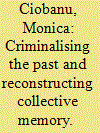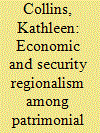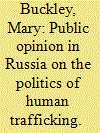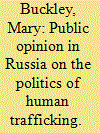|
|
|
Sort Order |
|
|
|
Items / Page
|
|
|
|
|
|
|
| Srl | Item |
| 1 |
ID:
086256


|
|
|
|
|
| Publication |
2009.
|
| Summary/Abstract |
The paper reviews the experience of the group Nord-Ost (The Regional Social Organisation for Assistance and Defence of the Victims of Terrorist Acts) as an example of an NGO that has taken a rights advocacy position which has led it into confrontation with the state. Nord-Ost demands the state's accountability for the consequences of its response to the 2002 Dubrovka terrorist attack. Thus, it confronts challenges common to other rights advocacy groups in Russia today.
|
|
|
|
|
|
|
|
|
|
|
|
|
|
|
|
| 2 |
ID:
086257


|
|
|
|
|
| Publication |
2009.
|
| Summary/Abstract |
This article analyses the report issued by the Presidential Commission for the Analysis of the Communist Dictatorship in Romania in January 2007 within the context of the politics of memory and justice in post-communist Romania. Crucial aspects of the work of the commission, such as its history and formation, mandate and make-up, methodological and conceptual framework, and the political reactions that it generated are examined. This leads to the conclusion that while the publication of the report brought some progress in revealing the truth, it is less likely to have a similar impact on transitional justice policies.
* A shorter version of this article was presented in October 2007 at the conference 'The Dream Factory of Communism' organised by Havighurst Center for Russian and Post-Soviet Studies at Miami University, Ohio. The field work was funded by the Presidential Research Award and supported by the Institute for Ethics in Public Life at Plattsburgh State University of New York. I would also like to thank Lavinia Stan for her useful comments on an earlier version of the article.
|
|
|
|
|
|
|
|
|
|
|
|
|
|
|
|
| 3 |
ID:
086255


|
|
|
|
|
| Publication |
2009.
|
| Summary/Abstract |
The 'new regionalism' has spread to Central Asia; yet there has been little success in implementing most regional initiatives there. Security regionalism has had greater success than economic regionalism, even though economic initiatives would bring great benefits to the economy and population. I propose a connection between patrimonialism and regionalism. Central Asia's patrimonial leaders are driven by survival and personal enrichment, and are beholden to informal vested interests. Since economic regionalism involves liberalisation that adversely affects these actors, the result is 'virtual' economic regionalism at best. In the case of security regionalism, some regional organisations progress because they bolster patrimonial regimes, with negative consequences for democracy.
|
|
|
|
|
|
|
|
|
|
|
|
|
|
|
|
| 4 |
ID:
086251


|
|
|
|
|
| Publication |
2009.
|
| Summary/Abstract |
The article examines the impact of the European Neighbourhood Policy (ENP) on domestic change in Ukraine during the period 2005-2007. Due to the interplay of external and domestic factors, no political leadership on European matters emerged in Ukraine under the ENP. The implementation of the Action Plan (AP)-the key instrument of the policy-has been left to the discretion of middle-level state officials, resulting in selective empowerment of sections of the state apparatus. However, without strong political engagement or an effective coordinating mechanism, this delivered slow, uneven and localised results. Nevertheless, despite the limited impact of the ENP, it is through the AP that the European Union has for the very first time started to affect domestic developments in Ukraine.
* The author gratefully acknowledges support from the British Academy (Grant number SG-38537) for research on Ukraine-EU relations under the European Neighbourhood Policy. She would also like to thank Tim Haughton, Iryna Solonenko, Nathaniel Copsey and Olga Shumylo for providing useful comments on the first draft of the article. Different version or sections of the article were presented at the seminar at St Anthony's College, Oxford University in January 2007, at the Wider Europe conference, European Research Institute, University of Birmingham in June 2007, the CREES Annual Conference, Cumberland Lodge, Windsor Great Park, June 2007 and the ICCEES European Congress 'Transcending Europe's Borders: The EU and Its Neighbours' in Berlin in August 2007.
|
|
|
|
|
|
|
|
|
|
|
|
|
|
|
|
| 5 |
ID:
086252


|
|
|
|
|
| Publication |
2009.
|
| Summary/Abstract |
The growing literature on human trafficking lacks survey data on citizens' attitudes towards it in states of origin. This article discusses the results of a nationwide public opinion poll conducted in June 2007 in Russia and explores the views of two focus groups. It examines Russians' thoughts about the causes and scale of human trafficking and beliefs about what should be done to tackle it, by whom and how. Both sets of data reveal pessimism about state capacity to address human trafficking effectively.
* Earlier versions of this paper were presented at the annual conference of BASEES, Fitzwilliam College, Cambridge, 29-31 March 2008, to the School of Public Policy, University College, London, 15 November 2007 and to the Hat Club, Hughes Hall, Cambridge, 17 October 2007. I am most grateful to the British Academy and the Russian Academy of Sciences for research trips to Moscow and St Petersburg in 2004 and 2007 and again to the British Academy for a small research grant which enabled me to visit a third time in June 2007 and to fund a nationwide public opinion poll and two focus groups held in Moscow and Vladimir. Thanks are due to Alexei Grazhdankin, Alexey Levinson and Svetlana Koroleva of the Levada Centre. Gratitude is also owed to anonymous reviewers for their feedback.
|
|
|
|
|
|
|
|
|
|
|
|
|
|
|
|
| 6 |
ID:
086254


|
|
|
|
|
| Publication |
2009.
|
| Summary/Abstract |
The growing literature on human trafficking lacks survey data on citizens' attitudes towards it in states of origin. This article discusses the results of a nationwide public opinion poll conducted in June 2007 in Russia and explores the views of two focus groups. It examines Russians' thoughts about the causes and scale of human trafficking and beliefs about what should be done to tackle it, by whom and how. Both sets of data reveal pessimism about state capacity to address human trafficking effectively.
* Earlier versions of this paper were presented at the annual conference of BASEES, Fitzwilliam College, Cambridge, 29-31 March 2008, to the School of Public Policy, University College, London, 15 November 2007 and to the Hat Club, Hughes Hall, Cambridge, 17 October 2007. I am most grateful to the British Academy and the Russian Academy of Sciences for research trips to Moscow and St Petersburg in 2004 and 2007 and again to the British Academy for a small research grant which enabled me to visit a third time in June 2007 and to fund a nationwide public opinion poll and two focus groups held in Moscow and Vladimir. Thanks are due to Alexei Grazhdankin, Alexey Levinson and Svetlana Koroleva of the Levada Centre. Gratitude is also owed to anonymous reviewers for their feedback.
|
|
|
|
|
|
|
|
|
|
|
|
|
|
|
|
|
|
|
|
|